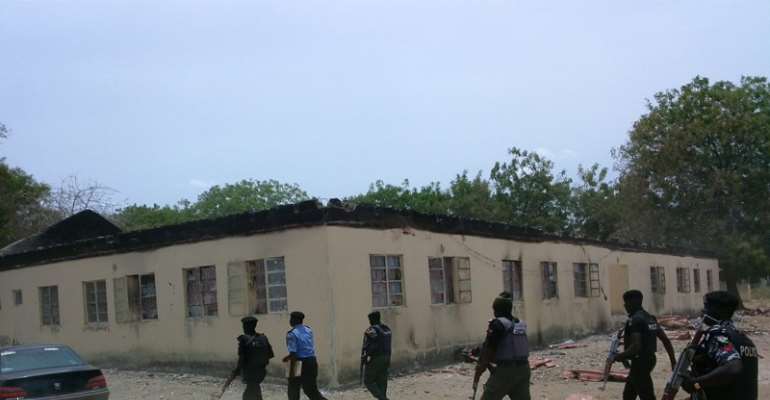Kidnapped Nigerian girls 'held near school for 11 days' — without intervention from authorities

In this photo taken Monday, April, 21. 2014. Security walk past burned government secondary school Chibok, where gunmen abducted more than 300 students in Chibok, Nigeria. AP Photo/ Haruna Umar
Photograph by: AP Photo/ Haruna Umar , Canada.com
The Nigerian schoolgirls kidnapped by Boko Haram were kept in the same spot near their school for 11 days without the authorities intervening, family members claimed Sunday.
In the latest attack on the Nigerian authorities' handling of the crisis, it was alleged that the girls languished in a camp just 20 miles from the north-eastern town of Chibok where they were abducted last month.
The Rev Enoch Mark, whose two daughters were among those kidnapped, said the military had missed a crucial chance to rescue the girls.
“For a good 11 days, our daughters were sitting in one place,” he told The Associated Press. “They camped them near Chibok, not more than 30 kilometres [away], and no help was in hand.”
Some 276 of the roughly 300 girls abducted on April 14 from their boarding school in Chibok in Borno state are believed to be missing. One of the teenagers who escaped from Islamic extremists said yesterday that the kidnapping was “too terrifying for words.”
Sarah Lawan, 19, told The Associated Press that more of the girls could have escaped, but that they were frightened by their captors' threats to shoot them.
“I am pained that my other colleagues could not summon the courage to run away with me,” she said.
In what may be an attempt to frustrate efforts to rescue the girls, militants carried out further attacks in north-east Nigeria yesterday, blowing up one of the main bridges into the region.
The latest violence took place in the town of Liman Kara, prompting about 3,000 people to flee. Abawu James Watharda, a local official, said that, because of the ensuing panic, no one had been able to give him accurate casualty figures. Last weekend, around 300 people were reported to have been killed in the remote north-eastern town of Warabe. Some of the residents fleeing Liman Kara said the insurgents had blown up the bridge that linked north-east Borno state – Boko Haram's main stronghold – with Adama state to the south. Adamawa is the main rearward operating base for the military efforts to quell the insurgency.
Last Monday, militants also destroyed a bridge linking Nigeria to neighbouring Chad, where it has hideouts in mountain caves. It was also reported that they had abducted the wife and two children of a retired police officer in north-east Nigeria. Teams of British, American and French experts have flown into the Nigerian capital, Abuja, to assist the government in trying to rescue the girls.
Yesterday, however, a prominent Nigerian Islamic scholar gave warning that having Western military experts on Nigerian soil could further escalate the conflict by drawing foreign extremists to west Africa. Ahmed Mahmud-Gumi, speaking in the northern city of Kaduna, said it “may trigger waves of terrorism never seen before”. “Foreign terrorists are eager to engage foreign forces, making Nigeria just another battle ground” like Afghanistan and Iraq, he said.
Meanwhile, Gen Ibrahim Babangida, a former Nigerian military ruler, urged the country's Muslims to stop extremists sullying the name of Islam.
“Islam enjoins you to live peacefully with fellow human beings,” he told BBC's Hausa Service. “Therefore, anybody who will come and smear our name, all Muslims should kick against that. Muslims should also do everything possible to stop this continued blackmail against the religion of Islam.”
In Qatar, the International Union for Muslim Scholars also condemned “the terrible crimes offensive to Islam” and said the actions of Boko Haram were “very far from Islamic teachings”.
It called on Boko Haram to immediately release the girls, saying that threats to sell them into slavery were against Sharia law.
On Saturday, David Cameron leant his support to the rescue operation, pledging that Britain was “ready to do anything” to help find the missing schoolgirls and holding a sign bearing the #BringBackOurGirls Twitter campaign slogan. Pope Francis also backed the campaign on Twitter on Saturday night, calling for followers to pray for the girls' release, as did Emma Watson, the actress.
